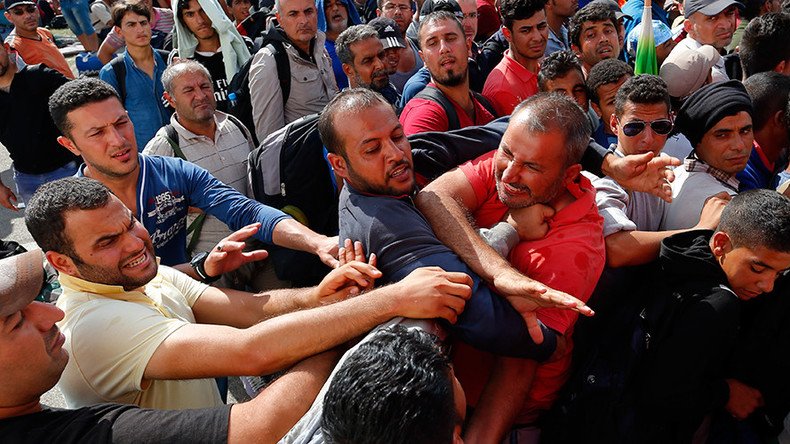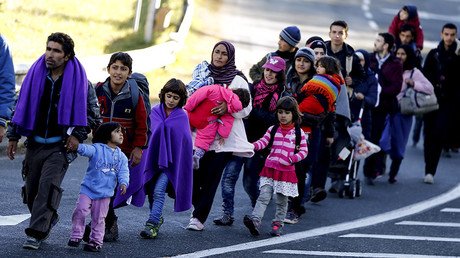In the wake of the attacks in Barcelona and Cambrils, Poland's interior minister said Europe should wake up to the “clash of civilizations” where Muslim enclaves form “support bases” for terrorists. He claimed Poland is safe as it had prevented the emergence of such "enclaves."
“We are dealing with a clash of civilizations,” Mariusz Blaszczak told state broadcaster TVP Info.
Blaszczak said he asked his country’s security services what they were doing to prevent similar incidents and noted thatPoland is safe because “we do not have Muslim communities which are enclaves, which are a natural support base for Islamic terrorists.”
The official, a member of the ruling rightwing Law and Justice Party (PiS), maintained Europe should “wake up” to what is happening.
A “possibility” to prevent terrorism is closing in Europe, according to the minister. Blaszczak also lashed out at the refugee resettling scheme in the EU, claiming it's “encouraging millions of people to come to Europe,” and that would effectively have tragic consequences.
The politician voiced his anti-immigration stance earlier this year when he suggested that Muslim settlements in Western Europe started from small numbers with Brussels now trying to shift responsibility.
Warsaw has been vehemently opposed to resettling migrants under a scheme advocated by Brussels and approved by the majority of European countries. Poland, along with Hungary, the Czech Republic, Romania, and Slovakia have firmly rejected the so-called refugee quotas, deepening East-West cracks in the 28-member bloc.
Jaroslaw Kaczynski, the Law and Justice leader, accused migrants in October 2015 of bringing cholera and dysentery as well as “all sorts of parasites and protozoa, which… while not dangerous in the organisms of these people, could be dangerous here.”
The xenophobic remarks caused controversy inside the government. Marek Sawicki, agriculture minister with the Polish People’s Party, the junior member of the ruling coalition, said this was “a reference to old, dangerous and dishonest sentiments from the time of the [Second World] war,”according to Politico.
The blunt outburst comes a day after the deadly attack on a tourist area in Barcelona which left 13 people dead and more than 100 others injured.
Authorities arrested suspect Driss Oukabir who, according to media reports, was reportedly born in Morocco but later moved to Marseille, France, and eventually to the Catalan town of Ripoli, some 80 miles north of Barcelona. However, the 28-year-old denies being involved in the attack and says his younger brother, 17-year-old Moussa Oukabir, stole his identification in order to rent the van that was used to plow into pedestrians on the city's busy La Rambla district.
Terror timeline: How attacks unfolded in Barcelona & Cambrils
Hours later, a second attack took place in the resort town of Cambrils, injuring seven people, one of whom later died. Police killed all five attackers there. All of them were identified as being of Moroccan origin, with one of them being the younger Oukabir.
Three Moroccans and a Spaniard have been detained by authorities, with Spanish police saying the suspects were preparing an even bigger attack, and that at least one member of the cell, 22-year-old Younes Abouyaaqoub, remains at large.
With every new terrorist attack carried out by non-EU nationals, the European public and politicians are showing growing discontent and unease, with Hungary, the Czech Republic and Poland refusing to abide by the EU's quota system for distributing migrants across the bloc.
Brussels has threatened legal action against the dissenting countries, filing a formal “infringement procedure” in June which could result in financial penalties imposed by the European Court of Justice.
READ MORE: 22.5% of German population have ‘migrant background’ – census
Europe has endured a series of attacks by foreign terrorists or attackers of migrant background in recent years.
An attack in June in the London Bridge area of the British capital saw eight people killed and 48 others injured. The perpetrators – a Pakistani-born British citizen, a failed asylum seeker from either Morocco or Libya, and a Moroccan-Italian man – first rammed their vehicle into pedestrians before going on a stabbing spree in the popular Borough Market.
In July 2016, a 31-year-old man of Tunisian nationality with a French residency permit bulldozed a lorry into a group of people celebrating Bastille Day in Nice, France, killing 86 people and injuring more than 400 others. This attack signaled the beginning of the recent spate of vehicle attacks.
Months earlier, in March 2016, bombings, perpetrated by mostly Belgian nationals of Moroccan descent, left 32 people dead and more than 300 injured at Brussels airport and Maalbeek metro station.
On November 13, 2015, a string of terrorist attacks across Paris left 130 people dead and 368 injured. Most of the attackers had French and Belgian citizenship, but all had fought alongside Islamic State (IS, formerly ISIS/ISIL) terrorists in Syria and some are believed to have entered Europe among the flow of refugees.
Recent figures from the International Organization for Migration (IOM) say around 119,069 people had arrived in Europe by sea so far this year.
In December 2016, the European Commission advised that EU member states invoke the so-called Dublin Regulations and gradually resume transfers of unauthorized migrants. Under the regulations, refugees must file their asylum applications in the EU country they first arrive in, meaning Italy and Greece are likely to shoulder most of the burden. Some countries have requested permission from Greece to send back migrants, but none have been transferred since mid-March.


